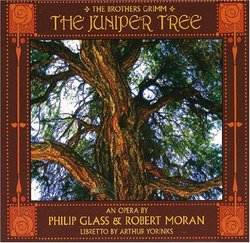I waited 24 years for this album to be recorded
Monica J. Kern | Lexington, KY United States | 10/14/2009
(5 out of 5 stars)
"I had the good fortune to be present at the world premier of this opera in 1985. I left the performance mesmerized, with the haunting refrain ("Mama killed me/ Papa ate me/ Little sister bundled my bones/ Under the Juniper/ Look, I'm a pretty bird!") running through my head, and I vowed to buy the recording as soon as it came out. But although I kept looking, it was never released... until this past spring. I'm not sure why this remained unrecorded for so long; perhaps it has something to do with the depressing nature of the opera, which is based on a fairy tale from the Brothers Grimm. The plot is pretty much summarized in the quote I give above: Evil, jealous stepmother schemes to kill the boy; sister is unwittingly made an accomplice in the plan and suffers great guilt; boy returns in the form of a bird to wreak revenge. Although the opera has a happy ending (or, more accurately, what passes for a happy ending in a Grimm Brothers fairy tale), the overall tone is definitely dark.
But it is dark in a beautiful way. Fans of Philip Glass should consider this an essential purchase. The standout track, in my opinion, is Act II, Scene I, a 7 minute tour de force as the lead soprano sings the refrain quoted above and is joined eventually by many of the villagers. The music is powerful, both emotionally and lyrically, so much so that I was impressed that my memory of it from 24 years earlier turned out to be remarkably accurate. The music is trademark Glass: relentless arpeggios performed by strings in ominous keys. While it is easy to tell which sections were composed by Glass and which were composed by his collaborator, Robert Moran, Moran's contributions hold their own and add greatly to the overall musicality of the opera.
Bottom line: If you are not a fan of Glass, or minimalism in general, you probably won't like this album. But I think "The Juniper Tree" is one of the great modern operas, and I am delighted to see this underrated gem finally enter the recorded archives."
Philip Glass/Robert Moran- The Juniper Tree
Michael C. Mahan | USA | 12/04/2009
(4 out of 5 stars)
""The Juniper Tree" consists of 30 minutes of music written by Glass and 42 minutes of music written by his collaborator, Robert Moran. The libretto is based upon the Grimm Brothers fairy tale about a magical juniper tree under his roots lie the remains of a man's first wife, and ultimately the murdered remains of his son from his second marriage. But all is not grim is this tale. Thinking herself the guilty party in the son's death, it is, in fact, the stepmother who is the guilty party. The son, reincarnated as a bird, seeks revenge on his murderer, which, once completed, paves the way for the father to be reunited with both his daughter and his resurrected son. All done by the magic of his first wife who lays buried under the juniper tree.
I have a certain sentimentality for this opera in that it is the only opera of Glass's that I saw, back around 1985 in Philadelphia at the old Walnut Street Theater. I remember it especially because it didn't "feel" like a real opera; it felt like something different. Maybe like "The Wizard of Oz" or something. It was a beautiful thing to experience. Although Glass was not present at the performance, Glass appeared many times in Philadelphia during the eighties, and I saw him at least three times during that decade with his ensemble; including one with a complete performance of "Music in Twelve Parts".
This recording is from the world premiere recordings in Cambridge, MA, back in 1985; performed by an orchestra assembled especially for the opera. In addition, keyboards augment the orchestra.
This work gives a good indication of the later operas that were to follow, serving as a bridge between ensemble driven pieces such as "Einstein on the Beach" and such later operas as "Belle et la Bete" that were more orchestral in nature. This work shows a strong early to mid-period minimalism of the Glass ensemble and such orchestral works as his score for "Koyanisqaatsi", and as such is a fusion of Glass's past, his 1985 present, and his 21st century future.
One thing that is of interest is to compare the movements written by Glass and those written by Robert Moran. Whereas the minimalism employed by Glass is more cyclic, or circular, and hence more emotional in intensity; the musical format employed by Moran is more traditional and therefore more linear in nature. The two styles offset one another, yet both move the story forward in different ways, and their fusion creates an interesting wholeness to the music and the opera.
(4.5 stars out of 5)
MC Mahan
"
The Juniper Tree
J. P. Anderson | Houston, TX USA | 11/09/2009
(4 out of 5 stars)
"This work continues to show Philip Glass at his peak some years ago. I always enjoy hearing how he blends his work and challenges our ears. Kudos to his collaborators for their vision and talent."


 Track Listings (10) - Disc #1
Track Listings (10) - Disc #1